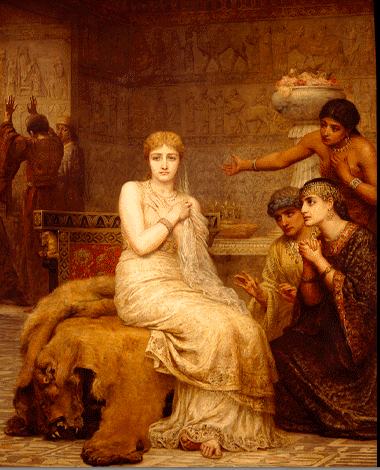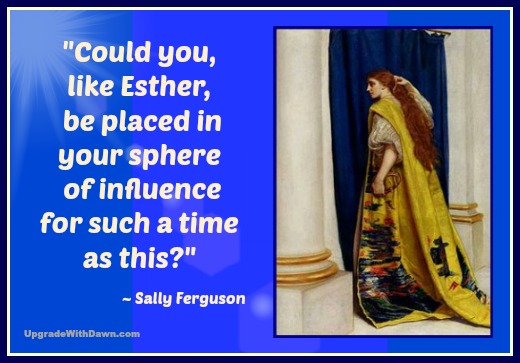When 'NO' Costs You EVERYTHING
Kolleen Lucariello is a funny, practical, godly woman. I've learned much from her posts and insights. In this Character UPGRADE, she points us to a woman worth emulating—and it's not the woman you might think.
"She said no. She was a defiant wife who had disrespected her husband in front of a bunch of influential men," Kolleen said. "I assumed I knew all I needed to know about her."
"I assumed I knew all I needed to know about her."
I (Dawn) appreciate Kolleen's thoughts about this "defiant wife." She's the often-overlooked woman in another woman's story—but she had character and dignity. Her defiance was likely a product of caution and discernment.
Kolleen continues . . .
I’d skim over this wife's part in the story of Esther because that’s what I’ve always been taught. My assumptions would be challenged when I saw her name this time, causing me to pause and consider the woman who said no.
Queen Vashti, the beautiful wife of King Xerxes, said no.
She was married to a man who loved power, praise and partying, and referred to himself as, “Xerxes the Great” and “king of kings.”
In the first chapter of the book of Esther, we read about the party he hosted lasting 180 days. His motive for gathering the powerful leaders from around his empire may have been to bring consolidation and gain political support.
What better way than to accomplish this than to display the wealth of his kingdom. King Xerxes liked to show off his possessions.
One was his queen, Vashti, who was a very beautiful woman (Esther 1:11). During this time in history, she really was just a possession. Some suggest Vashti may have been the daughter of another king Xerxes had formed an alliance with.
She was his trophy wife.
Following his big bash, the king hosted a banquet for all of the people in Susa, which lasted for seven days (Esther 1:5). During this banquet, Queen Vashti was hosting her own party for the ladies of the land in the royal palace.
As we read in the first chapter of Esther, the drinks were plentiful, and each man could drink what he wished (1:8). Can you imagine? Seven straight days of binge drinking?
Then, on the seventh day, when the king’s heart was “merry with wine” (1:10), he summoned his beautiful wife, Vashti, to come “to him with the royal crown on her head. He wanted the nobles and all the other men to gaze on her beauty, for she was a very beautiful woman” (Esther 1:11, NLT).
And then it happened.
She refused his invitation.
When I stop to consider the circumstances, I wonder:
- Was she being obstinate?
- Was her intent to dishonor and disrespect her husband?
- Or was there more to the story?
Imagine yourself in a room full of drunken men and you are the center of attention.
The men in the room may not have dared to touch her—she was, after all, the queen. But they were drunk.
Perhaps her no was a refusal to be exploited.
Perhaps it was to avoid the risk of being undressed—even with just their eyes.
Or was her no intended to protect her husband from the shame of what could happen.
Yes, her denial would have embarrassed the king; however, her denial also may have protected his reputation.
And let’s not forget, she was busy! She was in the middle of hosting her own party.
Rather than disregard Vashti’s no, perhaps there is something we can learn from it.
Does God want us to be honoring and respectful? Absolutely. But perhaps we say yes when He knows we should say no.
God has granted us the freedom to say no to any person, place or thing that would bring dishonor to Him—or us.
The truth is, our no might be the motivation God uses to spare another from a horrible tumble into sin. It also could be the catalyst He uses to bring about His plan and purpose.
Vashti’s no opened the door for Esther.
Without the necessary no, we may find ourselves:
- Overcommitted.
- Trapped in toxic relationships.
- Overburdened financially.
- And yes, left with shame and guilt.
It’s quite probable that we fail to speak our no because we fear what it might cost us.
I don’t deny a no can be costly; Vashti’s no cost her everything. She lost her position as queen.
But, what if—in that moment of decision for Vashti—she recognized that her worth did not come from her position as wife to the king of kings?
She knew she was royalty. Maybe, that’s what gave her the strength she needed to say no to his request.
Now, what if—in every moment of indecision we face—we recognize we too are royalty and our worth comes from the TRUE King of Kings. Would that give us the strength to say “no” to what God would consider inappropriate or offensive?
Your worth is never dependent on opinion, social status, family genealogy or your bank account. Your worth is found through your identity in Jesus Christ.
You are royalty!
We are royalty because we are daughters of God!
“But to all who believed him and accepted him, he gave the right to become children of God” (John 1:12, NLT); and since we are His children, we are His "heirs" (Romans 8:17).
Never be afraid to shout your no as you live to glorify the King of Kings.
Regardless of the cost.
Kolleen Lucariello, #TheABCGirl, is the author of thesoon-to-be-released #beYOU: Change Your  Identity One Letter at a Time. Koleen is also Co-director of the women's ministry, Activ8Her: helping women to build confidence in leadership, become courageous in our faith, and create connection in relationship. Kolleen and her high school sweetheart, Pat, reside in Central New York. She's a mother of three married children and Mimi to six incredible grandkids. For more information about Kolleen, visit her website or activ8her.org.
Identity One Letter at a Time. Koleen is also Co-director of the women's ministry, Activ8Her: helping women to build confidence in leadership, become courageous in our faith, and create connection in relationship. Kolleen and her high school sweetheart, Pat, reside in Central New York. She's a mother of three married children and Mimi to six incredible grandkids. For more information about Kolleen, visit her website or activ8her.org.
Painting: "Vashti Refuses the King's Summons" by Edwin Long.
 Post a Comment → Posted on
Post a Comment → Posted on  Thursday, March 12, 2020 at 9:50AM
Thursday, March 12, 2020 at 9:50AM  Character,
Character,  Courage,
Courage,  Discernment,
Discernment,  Esther,
Esther,  King Xerxes,
King Xerxes,  Kolleen Lucariello,
Kolleen Lucariello,  Stand Strong,
Stand Strong,  Upgrade with Dawn,
Upgrade with Dawn,  Vashti Upgrade Your Life
Vashti Upgrade Your Life  Biblical Thinking,
Biblical Thinking,  Character,
Character,  Choices
Choices 




